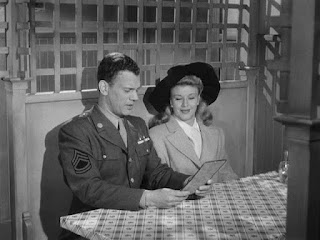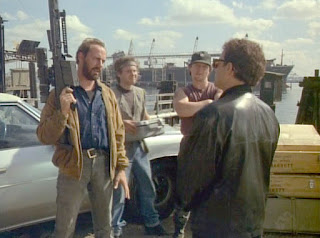Directed by Alfred E Green; produced by Ted Nasser
Insurance investigator Sam Donovan (Dennis O’Keefe) arrives in Marlowe City to look into the suicide of Roger Phillips. The first thing he notices is Anita Weatherby (Barbara Britton), who travelled in his compartment of the train to Marlowe, coming home for Christmas. The second thing is that no one in town seems too concerned with Phillips’s death. This includes the county sheriff (William Bendix) who, while not obstructive, is certainly not helpful. Donovan quickly learns that the suicide’s corpse had no powder burns – suggesting that he was shot from a distance – and no firearm was found at the scene. Donovan just as quickly suspects murder, but with an apathetic lawman and plenty of suspects, his Christmas probably won’t be merry.
Despite some flaws, Cover Up is rather a nifty little mystery. The acting is good (Hank Worden, credited as Worden Norten, appears as an undertaker), the direction adequate. The premise is excellent, with a set-up that makes the viewer wonder just what is going on.
Cover Up’s principal liability is the script – which, ironically, is also its best asset. First, one must wonder why an insurance company would send anyone to look into a suicide. Suicide cancels any payment on a death benefit, for obvious reasons. So, with the official verdict on the company’s side, and the company saving money because they wouldn’t have to pay out, nobody should have been sent to Marlowe to investigate.
This illogic is increased when Donovan’s boss insists that he prove Phillips’s demise was due to murder, despite a double indemnity clause that would give twice as much cash to a beneficiary as would normally be the case. It would have been much better – and easy – for the writers to have made Donovan a private detective, hired by a distant relative of Phillips, or perhaps a nosey reporter sniffing out a story.
Another flaw is that the movie does not ‘play fair’ with the audience, laying out the clues necessary for the solution of the mystery. There is no reason why a film must do this, but the structure of the story suggests that the usual whodunit’s rules were being followed. As well, the dead man is described by a character as ‘a blight’ on the community. However, aside from opposing his niece’s marriage (possibly for a good reason, for all we know), his heinous acts go untold.
Even with these not insignificant items, the script (co-written by star O’Keefe under a pseudonym) does pretty well. It builds an atmosphere that reflects the slight unreality in which Donovan finds himself, trying to interest people in a death no one cares about. His romance with Anita is not unconnected to the story, and a small-town feeling is successfully created.
The best part of the story is the fact that even as it nears a climax, the viewer will probably be kept from successfully deducing the truth. The multiple suspects and a second death that comes conveniently soon after the first may or may not be red herrings.
Cover Up certainly isn’t a top-grade crime drama; it’s writing is not neat enough for that. It is not good film noir, either, though I don’t believe it was attempting to be. It is, nonetheless, an entertaining and involving movie. And in that, I think, its makers succeeded in doing what they intended.










































